Deep Thinking about Dating
Long-term, deep thinking improves short-term decision-making.

In the ceaseless repetition of trends on social media, a certain degree of authenticity is sacrificed at the altar of algorithmic conformity and creative expediency. As a social scientist, scrolling through my social media feeds for hints of realism is tedious but rewarding. I stumbled across a lady TikToker, who grabbed my attention. She was folding laundry and talking to her screen like a close friend as she lamented her recent reentry into the dating world after a five-year hiatus. I listened and selected "follow," expecting more from the self-reported 39-year-old Mom with a keen mind and sharp southern tongue named Laura (not her real name). I was not disappointed.
Several days later, Laura posted a TikTok video proffering the following questions in rapid-fire sequence: Are we looking for forever or what we want right now? Do we know how to date? Have we forgotten? Are vows a thing of the past? Weighty queries for the 150-character world of TikTok commentary. Instead of unpacking a thesis-long reply, I complimented her on the question and referred her to a post I had written the previous year about dating. Without a doubt, social media has ushered in surrealistic connectivity linking highly filtered and dubious profiles of people from across the country with the click of a button. The abundance of mating opportunities spills onto our handheld devices like Noah's flood, distorting our reality and sense of possibility—too many choices to reasonably consider or vet. Given the abundance of choices, dating apps have become our society's default method or conventional path for finding potential partners.
However, when we live by default or convention, mindlessly following the crowd, we are often disengaged from our long-term plan or unique vision for our lives. We go through the motions, doing things mechanically without thinking deeply about the process or the outcomes. Random thoughts, whims, and ill-conceived actions rule our lives without a clear strategy, design, or direction. Though it might feel comfortable to run our lives on autopilot, nested in a safe cocoon of routine, life always jars us out of our illusion. To make changes and experience fulfillment, we must defy our comfortable routine and daily orthodoxy to upgrade our strategies. Long-term, deep thinking pulls back the curtain on our "automacy of being" exposing our self-defeating habits, rituals, and odes to the excesses of immediate gratification.
I posted this message on social media to see the responses, "It is very tough to build a long-term future on short-term thinking." Two responses caught my eye. "Have you seen the world?" And "Too many think they can do just that. Gotta think long-term, create a plan, then work it." The clarity we derive with long-term, deep thinking moves us beyond the world's hype, crystallizing our vision for today and the future. It also gives us insight into things we value and people who matter to us. Deep contemplation helps us learn about ourselves, understand the big picture, and fathom why we do what we do. It enables us to be present and feel more in control. As a result, we become strategic in our thinking, planning, and execution.
Consider the graphic below on long-term, deep thinking as it considers the binary decision to work out or not to work out to reduce stress, lose weight, and feel energized. The white rectangles represent positive feelings, and the dark ones represent negative feelings. Avoiding the distress of working out when we are tired, sad, or unmotivated feels positive in the moment. Crossing the vertical dotted line, we arrive at a few consequences to our decision as we ask what's next.
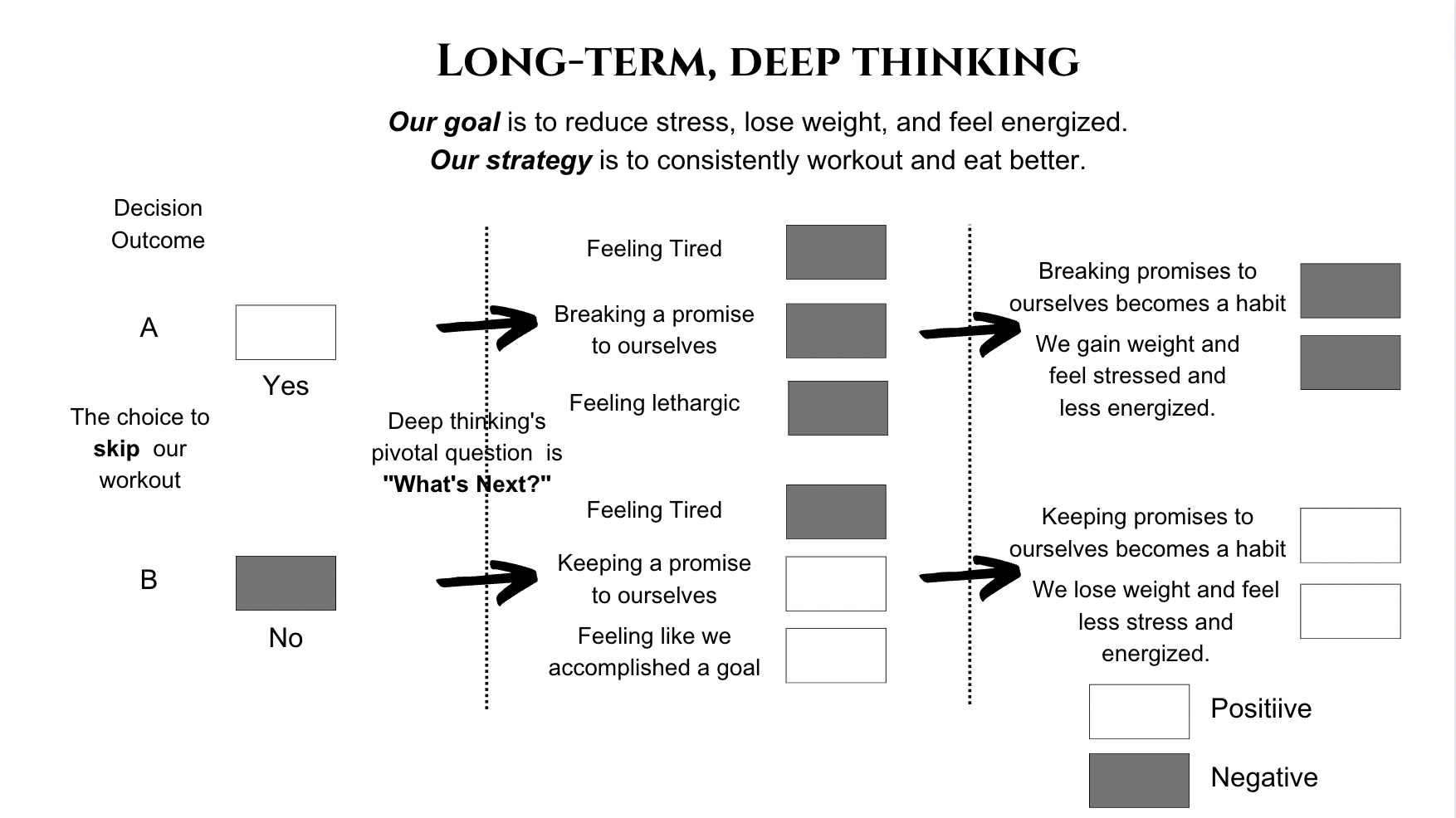
It is essential to note the collateral cost or benefit of keeping a promise to ourselves in forming self-trust, confidence, and habit formation. Making a simple in-the-moment choice to work out or not produces a chain of causal consequences beyond not achieving our stated goal of reducing stress, losing weight, and feeling energized.
My formative adult years in international affairs taught me to think deeply about a nation's interests, incentives, and competition. I viewed the intense friction of competing interests based on existing incentives as usual, healthy, and clarifying. As the result of my deeper contemplation, I formulated strategies that often put me at odds with the prevailing orthodoxy as I recommended U.S. policy action that defied the status quo. Strategy is defined as identifying long-term or overall aims and interests and the means of achieving them.(1)
As a policy implementor, not a policy maker, I made recommendations and watched events validate my thinking. Subsequently, I internalized the lessons learned from vested interests clinging to lousy strategy and poor policy flexibility. Ever curious, I became enamored with the concept of grand strategy, which is a nation's most essential and enduring interests, and its theory for how it will defend or advance them based upon the incentives available in the competition among states. Duke's Professor Peter Feaver offered a more concise definition, "Grand strategy is the art of reconciling ends and means."(2) Every day, we are incentivized to make choices and decisions that move us toward or away from our interests as we reconcile ends and means. In the graphic below, I offer a simple Grand Strategy process to consider using to reconcile our essential long-term interests and means.
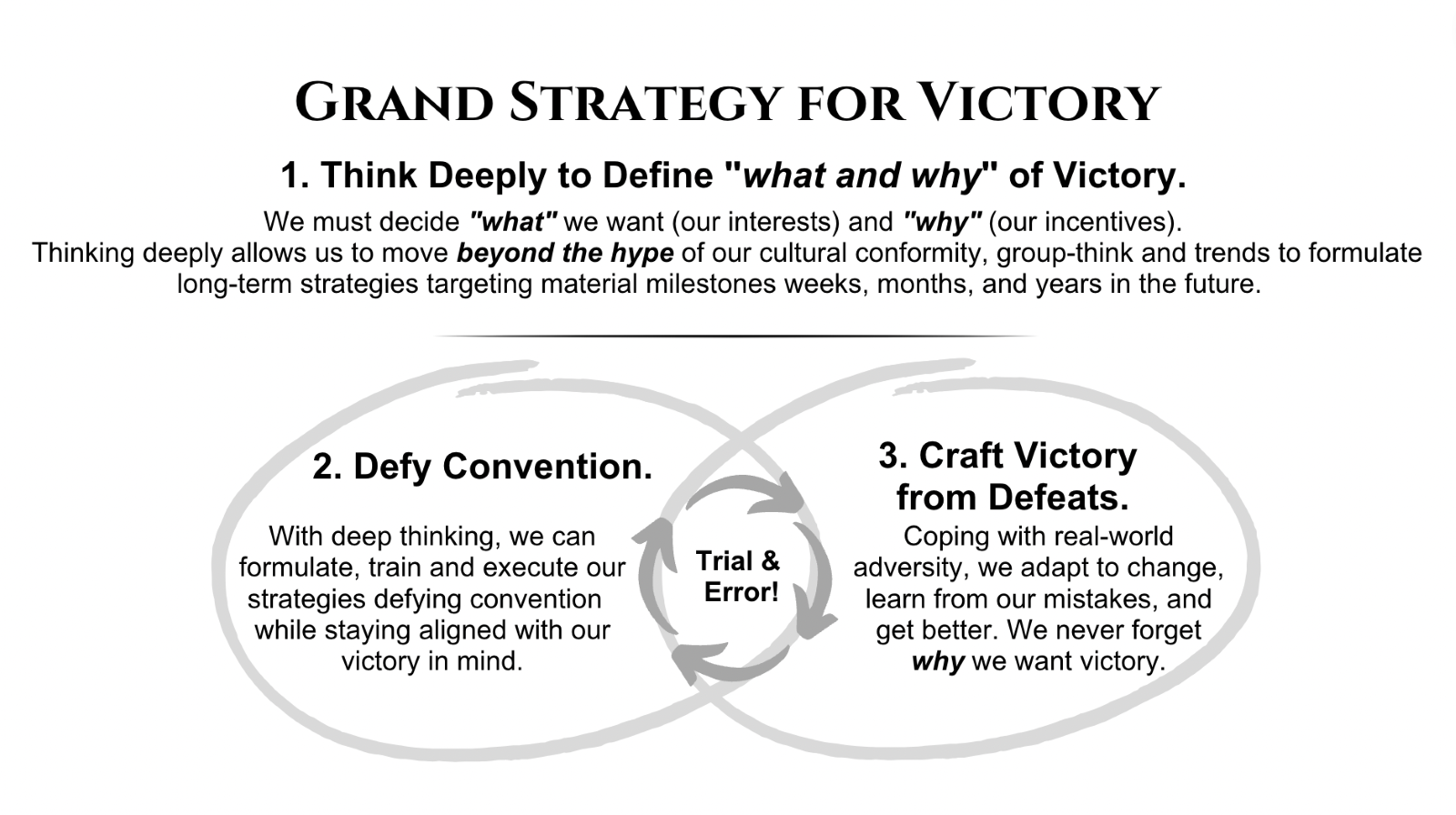
Thinking deeply about what we want and how to get it allows us to focus on what is imperative. It becomes easier to move beyond the hype, ignore distractions from our goals, and defy conventional trends. The shiny objects meant to distract us, like hundreds of potential partners on dating apps, slowly fade into the background. Laura, the intelligent and attractive TikToker, followed her post hours later with another video highlighting our obsession with instant gratification. I added, "You're right. We crave the dopamine that hits our brain from our handheld technology played out in the dating world. The new, new mating triggers our brain chemistry." She quickly replied, "Absolutely correct. So basically, it's an addiction to the "newest."
Despite the promotional hype, the business model for dating apps is not long-term coupling. When members talk to each other, apps make money, an estimated $2.98 billion in 2023.(3) High relationship turnover is critical to their profitability and depends on long-term users rather than long-term coupling. Dating apps epitomize the adage, "The best lies are wrapped in the truth." Pulling back the curtain on dating apps a little further, we find they sell access to a buzz of messages from new and better potential mating partners, feeding the little dopamine hits to our brains and acting as the ultimate incentive to be on a perpetual search.
Which leads to the question. Are our dopamine cravings exacerbated by our handheld information portals putting a wrench in our dating world? Absolutely. Are endless choices at our fingertips and the need for instant gratification fracturing our forever vows? Again, no question. To what degree each impacts our mating and long-term coupling will be a matter of research and debate. Swiping left or right on a dating app resembles scrolling through TikTok's short-form video platform. Unsurprisingly, TikTok reached one billion users faster than any other platform in an attention-deficit culture, craving tiny dopamine hits. (4)
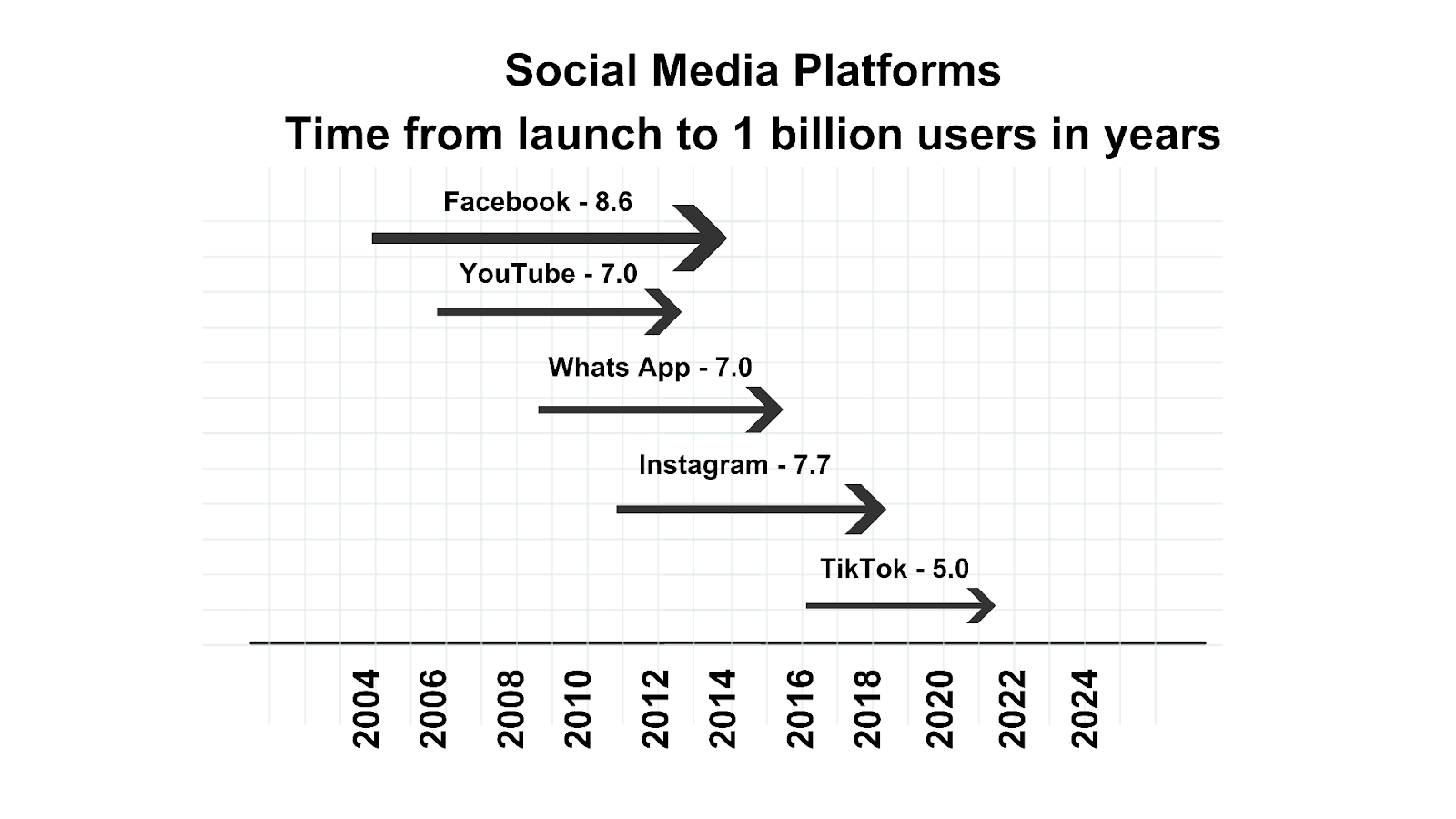
If I heard Laura correctly, her TikToks were a plea for understanding the radical changes in the dating scene and for sanity and solutions to future success in coupling. The rate of change in the last 100 years has been astounding. Below is a graphic depicting the growth in world Gross Domestic Product (GDP) and life expectancy since 1900 as two measures of the quickening pace of progress.
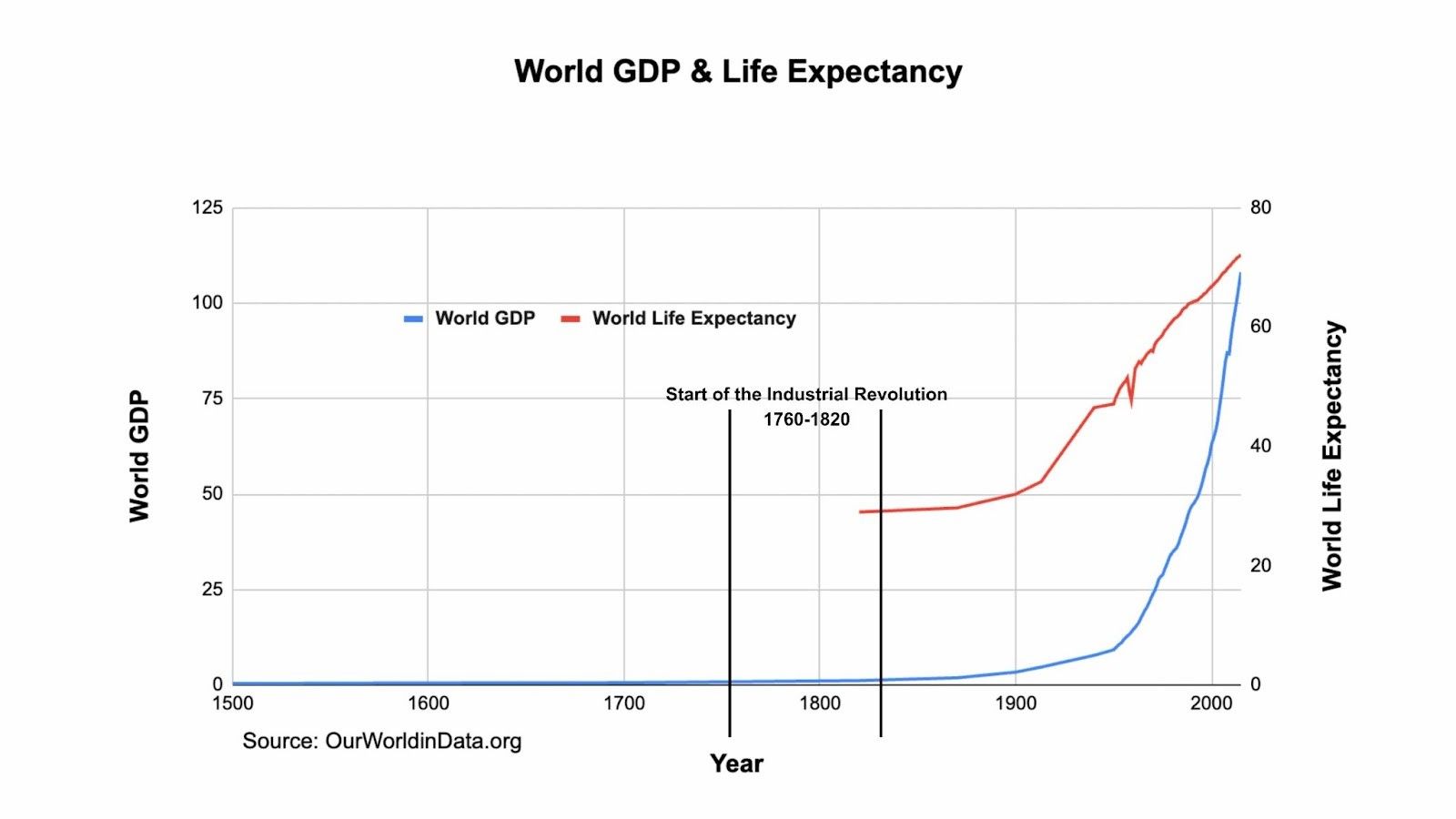
Digesting the impact of dopamine on our brains and the speed of societal change suggests that the sad evolution of dating fueled by apps was inevitable. Dating apps are a medium of connection, which is another form of (social) media. Therefore, consider this quote by the legendary singer of The Doors, "Whoever controls the media controls the mind." Instead of lamenting the shallowness of the dating arena caused by new technology, we should avoid the social gravity of dating platforms by opting for another strategy after turning to deep thinking to improve short-term decision-making.
The process of deep thinking can be articulated in three layers or orders of deliberation. First-order thinking is fast and easy. It happens when we look for something that only solves the immediate problem without considering the consequences. A dating app offers dozens of viable partners in our zip code. Potential suitors swipe right or left, and we have a date. We are energized and juiced by the possibility as the little spike of dopamine hits our brains.
Second-order thinking is deeper and less superficial. It is thinking about interactions and time understanding that despite our best efforts, our interventions often cause harm. Second-order thinkers ask themselves the question, "And then what?" Third-order thinking goes further, pressing over the horizon toward our true identity, purpose, or innermost vision. Third-order thinking contemplates our ultimate victory years in the making. This means thinking about the potential impacts of repeatedly using dating apps that produce dates but not necessarily long-term partners. Third-order thinking arrives at the question, do we want a date or a long-term mate?
This means we think about the consequences of repeatedly choosing potential partners from a dating app who only seek a date or a physical connection. We're likely wedded to a coupling treadmill by continuing to use a dating app. First-order thinking is easy to identify as it looks and feels like the prevailing trend aligned with the masses reaching the same conclusions. Flipping the script, we realize the road to out-thinking our challenges can come from something other than first-order thinking. It must come from second or third-order thinking. Better results will result from seeing things that other people can't see.
Looking at the graphic below, the logic of using a dating app (Decision Outcome A) feels positive in the moment because it solves the problem of getting a date. We cross the vertical dotted line to second-order thinking by asking what's next, highlighting the challenges of apps as a medium for a lasting connection. If expediency demands using technology to connect with potential partners, consider using any social media platform to form friendships (Decision Outcome B).
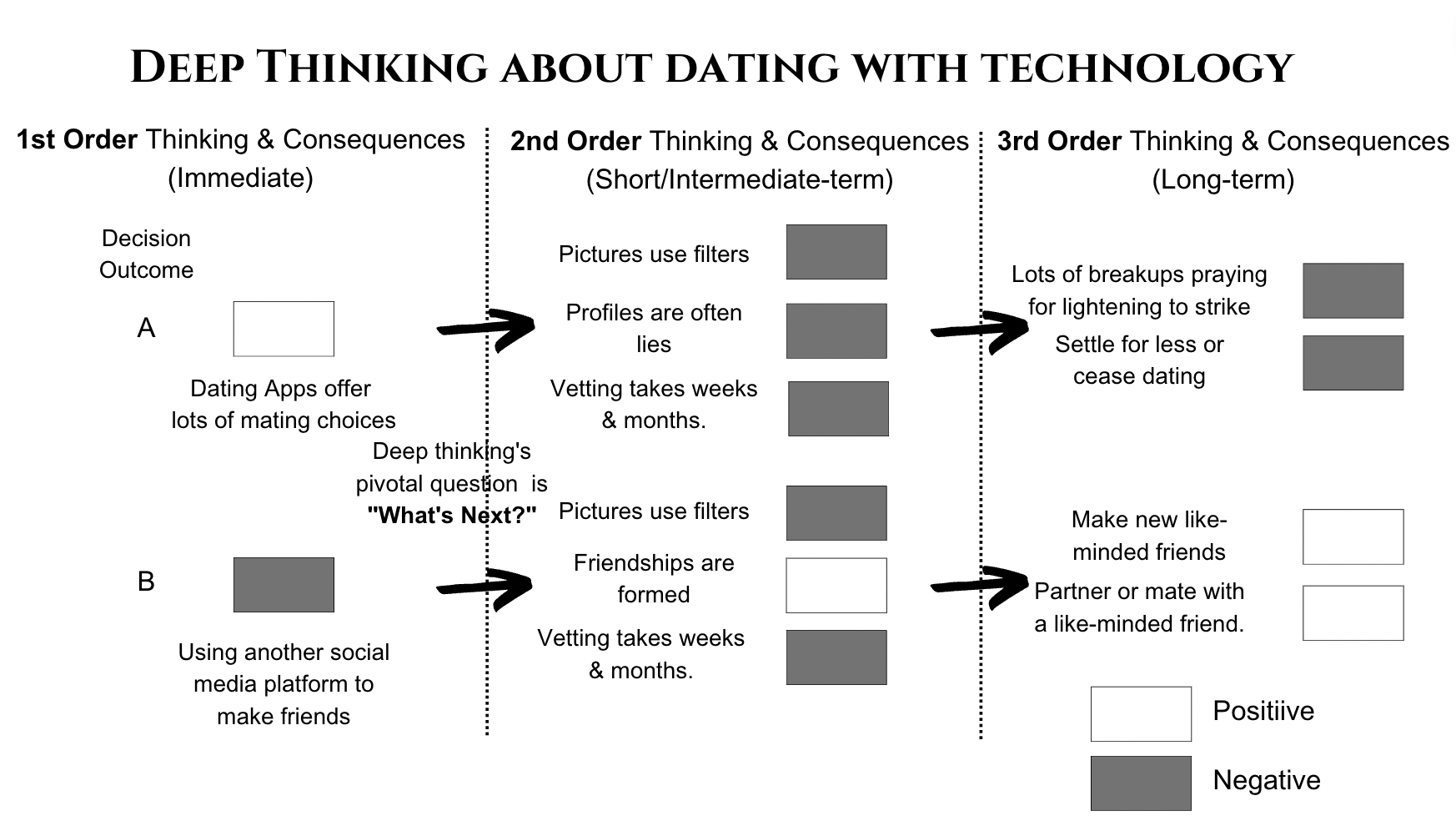
After thinking through the challenge of modern dating, I offer an alternative path or logic. Extraordinary results or performance comes from seeing things that other people can't see. Meeting through friends or family has been a tried-and-true dating method for generations because potential partners are already vetted. Suppose we use a social media platform to find and cultivate friendships. In that case, we still face the daunting task of fake pictures, profiles, inevitable liars, and copious amounts of time to vet potential friends. Since most social media algorithms are designed to create tribes by matching like-minded people, friend connections will likely be made in line with the effort we expend.
From the algorithm-derived similarities, groups of friends can and do form. Social media and its business model of connecting like-minded people to meet, connect, and create content is now working for us, not against us. Recall that the business model for dating apps derives profitability from ongoing conversation or monthly membership rather than by generating successful, long-term connections. After getting to know (think in terms of months, not weeks) our newfound social media technology-driven friends, we can ask them for dating suggestions. My logic is an old-school approach to dating, leveraging existing technology. My second-order thinking solution is far from perfect, but it moves us beyond the hype and tease of dating apps to deliver likely far superior and lasting outcomes.
In conclusion, one of Laura's questions lingered obsessively in my gray matter. "Are vows a thing of the past?" In a society dominated by the hype of instant gratification and short-term thinking, long-term commitments like marriage vows are brutally sacrificed on the altar of pleasure-seeking. Plus, technology will deliver plenty more fish in the sea to date when we have grown tired of doing the hard work of relationship building. I am reminded of a quote from the world's fastest man, Usain Bolt, "I trained four years to run nine seconds, and people give up when they don't see results in two months." Imagine the mindset and deep thinking required to diligently train and sacrifice for four years only to enjoy nine seconds of potential benefit without any guarantees of success. How much time should we invest in the ups and downs of a relationship for a lifetime of love and caring??
Endnotes
(1) Oxford Dictionaries, s.v. “strategic (a.),” accessed August 15, 2023, https://www.oxforddictionaries.com/definition/english/strategic.
(2) Peter D. Feaver, “What Is Grand Strategy and Why Do We Need It?,” Foreign Policy, April 9, 2009, https://foreignpolicy.com/2009/04/08/what-is-grand-strategy-and-why-do-we-need-it/.
(3) Statista. "Online Dating - Worldwide," Retrieved 8-7-2023, https://www.statista.com/outlook/dmo/eservices/dating-services/online-dating/worldwide.
(4) Katharina Buchholz, "The Road to a One Billion Users," Statista, October 14, 2021, https://www.statista.com/chart/25974/social-networks-time-spent-to-reach-one-billion-mau/#:~:text=Social Media,-by Katharina Buchholz&text=Launched to the international market,in just under five years.

